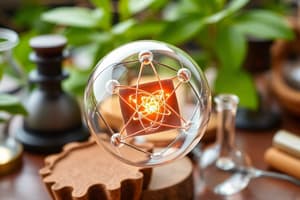Podcast
Questions and Answers
Which branch of science studies matter, energy, and forces?
Which branch of science studies matter, energy, and forces?
- Chemistry
- Psychology
- Physics (correct)
- Biology
What is the first step of the scientific method?
What is the first step of the scientific method?
- Observation (correct)
- Analysis
- Hypothesis
- Question
Which characteristic of science refers to the ability to be tested through experiments?
Which characteristic of science refers to the ability to be tested through experiments?
- Empirical
- Testable (correct)
- Falsifiable
- Reproducible
Which of the following is NOT considered a part of the natural sciences?
Which of the following is NOT considered a part of the natural sciences?
How does science enhance societal decision-making?
How does science enhance societal decision-making?
What does the term 'self-correcting' mean in the context of science?
What does the term 'self-correcting' mean in the context of science?
Which of these is an example of formal science?
Which of these is an example of formal science?
What is a key trend in modern science that encourages public involvement?
What is a key trend in modern science that encourages public involvement?
Flashcards are hidden until you start studying
Study Notes
Definition of Science
- Systematic enterprise that builds and organizes knowledge.
- Involves observation, experimentation, and analysis.
Main Branches of Science
-
Natural Sciences
- Study of natural phenomena.
- Includes:
- Physics: Study of matter, energy, and forces.
- Chemistry: Study of substances, their properties and reactions.
- Biology: Study of living organisms and life processes.
-
Formal Sciences
- Study of abstract concepts and systems.
- Includes:
- Mathematics: Study of numbers, quantities, and shapes.
- Logic: Study of reasoning.
- Computer Science: Study of computation and information processing.
-
Social Sciences
- Study of human behavior and societies.
- Includes:
- Psychology: Study of mind and behavior.
- Sociology: Study of social behavior and structures.
- Economics: Study of production, distribution, and consumption of goods.
Scientific Method
- Observation: Gathering data through senses or instruments.
- Question: Formulating a question based on observations.
- Hypothesis: Proposing a testable explanation or prediction.
- Experimentation: Testing the hypothesis through controlled experiments.
- Analysis: Interpreting data collected from experiments.
- Conclusion: Drawing conclusions based on the analysis.
- Communication: Sharing results with the scientific community.
Importance of Science
- Enhances understanding of the universe and natural laws.
- Drives technological and medical advancements.
- Informs policy decisions and societal challenges.
- Promotes critical thinking and problem-solving skills.
Characteristics of Science
- Empirical: Based on observed and measured phenomena.
- Testable: Must be able to be tested through experiments.
- Falsifiable: Hypotheses should be able to be disproven.
- Reproducible: Results should be consistent when experiments are repeated.
- Self-correcting: Open to revision based on new evidence.
Current Trends in Science
- Interdisciplinary research: Combining methods and insights from different fields.
- Citizen science: Public participation in scientific research.
- Open access: Free availability of scientific articles and data.
- Emphasis on sustainability: Addressing environmental challenges through science.
Definition of Science
- Systematic pursuit of knowledge through organized methods.
- Relies on observation, experimentation, and analysis to build understanding.
Main Branches of Science
-
Natural Sciences: Investigation of natural phenomena.
- Physics: Examines matter, energy, and forces.
- Chemistry: Explores substances, their properties, and reactions.
- Biology: Studies living organisms and life processes.
-
Formal Sciences: Focuses on abstract concepts.
- Mathematics: Analyzes numbers, quantities, and shapes.
- Logic: Investigates reasoning principles and structures.
- Computer Science: Examines computation and information processing.
-
Social Sciences: Conveys understanding of human behavior and society.
- Psychology: Looks into the mind and behavioral patterns.
- Sociology: Studies social interactions and institutional frameworks.
- Economics: Analyzes production, distribution, and consumption of goods.
Scientific Method
- Observation: Collecting data using sensory input or instruments.
- Question: Formulating inquiries based on gathered observations.
- Hypothesis: Creating a testable explanation or prediction.
- Experimentation: Conducting controlled tests to validate the hypothesis.
- Analysis: Interpreting the data collected from experimental results.
- Conclusion: Making decisions based on data analysis.
- Communication: Disseminating findings to the broader scientific community.
Importance of Science
- Deepens understanding of the universe and its governing laws.
- Fuels advancements in technology and medicine.
- Aids in forming informed decision-making in policy and society.
- Encourages critical thinking and enhances problem-solving abilities.
Characteristics of Science
- Empirical: Relies on measurable and observable evidence.
- Testable: Must allow for hypotheses to be tested through experimentation.
- Falsifiable: Hypotheses should be disprovable if they are incorrect.
- Reproducible: Experimental results must be consistent across trials.
- Self-correcting: Willingness to revise based on emerging evidence.
Current Trends in Science
- Increasingly interdisciplinary, integrating insights from various fields.
- Citizen science encourages public involvement in research endeavors.
- Movement towards open access for scientific resources and publications.
- Focus on sustainability, prioritizing solutions for environmental issues through scientific exploration.
Studying That Suits You
Use AI to generate personalized quizzes and flashcards to suit your learning preferences.




